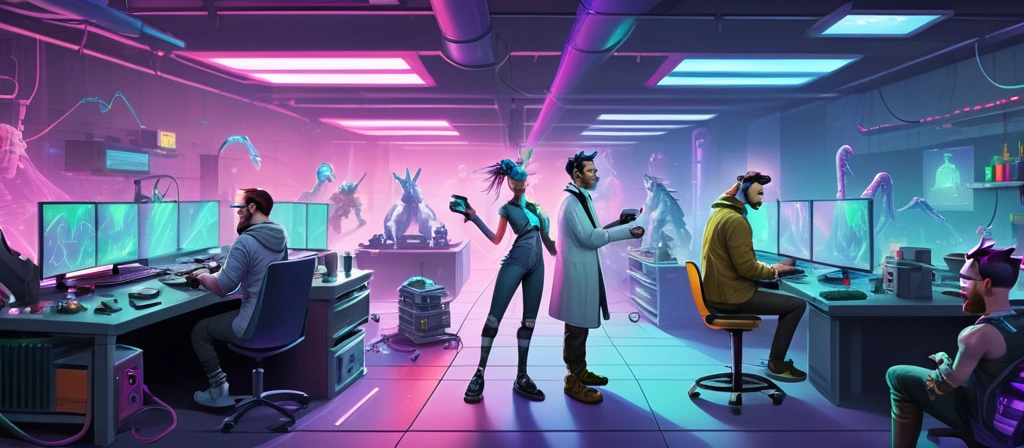Acknowledging supporters and friends is the norm for any book, but it is especially significant—nay, vital—in a book all about collaborative research.
We start by thanking our many friends in the ModLab at UC Davis, the faculty, postdocs, graduate students, and undergraduates who, since the lab’s founding in 2008, have made it such a productive, creative, and enjoyable place to work. The Appendix to this book lists the names of all past and current ModLab members as well as the undergraduate interns who contributed to development of Play the Knave.
We are grateful to our colleagues in the IMMERSe Network and to everyone at the Games Institute at the University of Waterloo. In particular, we owe a huge debt of gratitude to Neil Randall, Karen Collins, Agata Antkiewicz, and Emily West, all of whom were instrumental to our work as a lab and to the Play the Knave project in particular.
Thanks also to the Stratford Festival for supporting the first major public debut of Play the Knave. We are especially grateful to Anita Gaffney, Calvin Wood, Jason Clarke, Paul Muncaster, Carla Fowler, Andy Mark, Marion Burr, and Liza Giffen. Since that installation, scores of Play the Knave performers have enjoyed strutting the digital boards on the 3D model of the Stratford Festival stage that was created by Steven Kemp, to whom we are also grateful.
Many other individuals outside of our institution contributed to Play the Knave. In particular, we thank Daniel Schrimshire for creating the logo, Byron Jennings for designing most of the historical avatars, and Kam Meredith for generating early ideas for the game’s theme music. For allowing us to use their 3D models of historic stages, we thank Jennifer Roberts-Smith and Shawn DeSouza-Coelho (SET project); Angus Vail (Container Globe); and Lazaros Kastanis (Ortelia).
Thanks to Elliott Visconsi and Katherine Rowe for their prescient advice about how the Shakespeare 400 anniversary could advance our project. Thanks to Marge Garber for suggesting the playful acronym of THAMES (Technology, Humanities, Arts, Math, Engineering, and Science), which has been tremendously generative for our thinking about postdisciplinary collaborations.
Our lab became a physical reality thanks to the vision of our former dean of Humanities, Arts, and Cultural Studies at UC Davis, Jessie Ann Owens, who was a key early supporter of the ModLab. We are grateful for additional funding from several other sources at UC Davis: the Interdisciplinary Frontiers in the Humanities and Arts (IFHA) program, the UC Davis Senate Committee on Research, and the Davis Humanities Institute. We received additional funding from UC Davis alumna Margaret Bowles, the University of California Humanities Research Institute, and the Canadian Social Sciences and Humanities Research Council (SSHRC), the latter generously supporting many of ModLab’s projects through the IMMERSe Network.
Thanks to the many institutions and organizations that hosted installations of or workshops on Play the Knave, or invited us to deliver talks about research discussed in this book: American Society for Theatre Research; Australian and New Zealand Shakespeare Association; Blackfriars conference and American Shakespeare Theatre; California Teachers Association Good Teaching Conference; California State University, Bakersfield; California State University, Chico; Clemson University; Dartmouth College; Davis Arts Center; Dyer Arts Center, National Technical Institute for the Deaf, Rochester Institute of Technology; Gallaudet University; Indiana University of Pennsylvania; Meaningful Play conference; National Council of Teachers of English; New York University; Northwestern University; Notre Dame University; Otago University, New Zealand; University of the Pacific; Queen Mary University; San Diego State University; Shakespeare Association of America; National Chung Hsing University in Taiwan; The Folger Shakespeare Library; University of California, Davis; University of California, Irvine; University of California, Los Angeles; University of California, Merced; University of California, Santa Barbara; University of Cape Town; University of Iowa; University of Michigan; University of Nevada, Reno; University of Waterloo; University of Wisconsin Play Make Learn conference; University of Witswatersrand; Utah Shakespeare Festival; William and Mary College; World Shakespeare Congress. We are very grateful to the individuals who organized events at these venues and to the audiences who attended, contributing their ideas and their playful energy.
We are grateful to everyone at EMC Imprint, especially our editor Andrew Griffin, our book designer Lex Taylor, and the anonymous peer reviewers for the press. We also received invaluable copyediting assistance from Ofir Cahalan and Allison Adelman. For help in creating or enhancing some of the images in this book, we thank ArtBot and the Stable Horde distributed cluster.
Last but not least, each of us wishes to thank our family and personal friends for all their support, patience, and love.
